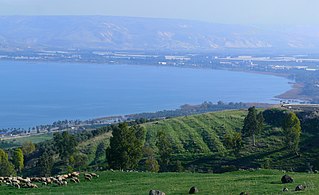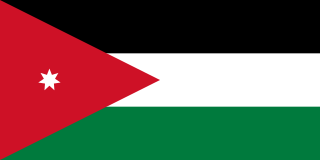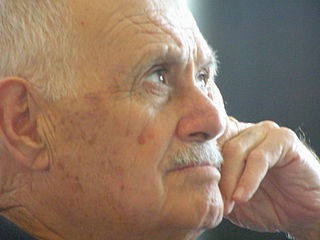HKJ is an abbreviation for the Hashemite Kingdom of Jordan, a country more commonly known simply as Jordan.
HKJ can also refer to:
- Hongkong Jet, an airline from Hong Kong
- Hapoel Katamon Jerusalem F.C., a football club from Jerusalem, Israel
HKJ is an abbreviation for the Hashemite Kingdom of Jordan, a country more commonly known simply as Jordan.
HKJ can also refer to:

Jerusalem is an ancient city in West Asia, on a plateau in the Judaean Mountains between the Mediterranean and the Dead Sea. It is one of the oldest cities in the world, and is considered holy to the three major Abrahamic religions—Judaism, Christianity, and Islam. Both Israelis and Palestinians claim Jerusalem as their capital; Israel maintains its primary governmental institutions there, and the State of Palestine ultimately foresees it as its seat of power. Neither claim, however, is widely recognized internationally.

The Six-Day War or June War, also known as the 1967 Arab–Israeli War or Third Arab–Israeli War, was fought between Israel and a coalition of Arab states from 5 to 10 June 1967.

The Sea of Galilee, also called Lake Tiberias or Kinneret, is a freshwater lake in Israel. It is the lowest freshwater lake on Earth and the second-lowest lake in the world, at levels between 215 metres (705 ft) and 209 metres (686 ft) below sea level. It is approximately 53 km (33 mi) in circumference, about 21 km (13 mi) long, and 13 km (8.1 mi) wide. Its area is 166.7 km2 (64.4 sq mi) at its fullest, and its maximum depth is approximately 43 metres (141 ft). The lake is fed partly by underground springs, but its main source is the Jordan River, which flows through it from north to south and exits the lake at the Degania Dam.

The Mount of Olives or Mount Olivet is a mountain ridge in East Jerusalem, east of and adjacent to Jerusalem's Old City. It is named for the olive groves that once covered its slopes. The southern part of the mount was the Silwan necropolis, attributed to the elite of the ancient Kingdom of Judah. The western slopes of the mount, those facing Jerusalem, have been used as a Jewish cemetery for over 3,000 years and holds approximately 150,000 graves, making it central in the tradition of Jewish cemeteries. Atop the hill lies the Palestinian neighbourhood of At-Tur, a former village that is now part of East Jerusalem.

The Palestinian territories are the two regions of the former British Mandate for Palestine that have been occupied by Israel since the Six-Day War of 1967, namely the West Bank and the Gaza Strip. The International Court of Justice (ICJ) has referred to the West Bank, including East Jerusalem, as "the Occupied Palestinian Territory", and this term was used as the legal definition by the ICJ in its advisory opinion of July 2004. The term occupied Palestinian territory was used by the United Nations and other international organizations between October 1999 and December 2012 to refer to areas controlled by the Palestinian National Authority, but from 2012, when Palestine was admitted as one of its non-member observer states, the United Nations started using exclusively the name State of Palestine. The European Union (EU) also uses the term "occupied Palestinian territory". The government of Israel and its supporters use the label "disputed territories" instead.

The Israel–Jordan peace treaty, sometimes referred to as the Wadi Araba Treaty, is an agreement that ended the state of war that has existed between the two countries since the 1948 Arab–Israeli War and established mutual diplomatic relations. In addition to establishing peace between the two countries, the treaty also settled land and water disputes, provided for broad cooperation in tourism and trade, and obligated both countries to prevent their territory being used as a staging ground for military strikes by a third country.

East Jerusalem is the sector of Jerusalem that was held by Jordan after the 1948 Arab–Israeli War, as opposed to the western sector of the city, West Jerusalem, which was held by Israel. Under international law, East Jerusalem is considered a part of the West Bank and, therefore, of the Palestinian territories. A number of states recognize East Jerusalem as the capital of the State of Palestine, whereas other states assert that East Jerusalem "will be the capital of Palestine", while referring to it as "an occupied territory".

"Jerusalem of Gold" is an Israeli song written by Naomi Shemer. Often contrasted with the official anthem Hatikva, the original song described the Jewish people's 2,000-year longing to return to Jerusalem. Shemer added a final verse after the Six-Day War to celebrate Jerusalem's re-unification.

The Greek Orthodox Patriarchate of Jerusalem, also known as the Greek Orthodox Church of Jerusalem, is an autocephalous church within the wider communion of Eastern Orthodox Christianity. Established in the mid-fifth century as one of the oldest patriarchates in Christendom, it is headquartered in the Church of the Holy Sepulchre in Jerusalem and led by the patriarch of Jerusalem, currently Theophilos III. The patriarchate's ecclesiastical jurisdiction includes roughly 200,000 to 500,000 Orthodox Christians across the Holy Land in Palestine, Jordan and Israel.

The Jordanian administration of the West Bank officially began on April 24, 1950, and ended with the decision to sever ties on July 31, 1988. The period started during the 1948 Arab-Israeli War, when Jordan occupied and subsequently annexed the portion of Mandatory Palestine that became known as the West Bank, including East Jerusalem. The territory remained under Jordanian control until it was occupied by Israel during the 1967 Six Day War and eventually Jordan renounced its claim to the territory in 1988.

Jerusalem International Airport is an unused regional airport located in the city of Jerusalem. When it was opened in 1924, it was the first airport in the British Mandate for Palestine.

Ramat Eshkol is an Israeli settlement and neighborhood in East Jerusalem. It was built on land captured from Jordan in the Six-Day War and was the first neighborhood built in East Jerusalem after the Six-Day War in 1967. The international community considers Israeli settlements in East Jerusalem illegal under international law, but the Israeli government disputes this.

Bahjat al-Muhaisen was a Jordanian military officer who served in significant infantry commands during his career.
The Mixed Armistice Commissions (MAC) is an organisation for monitoring the ceasefire along the lines set by the General Armistice Agreements. It was composed of United Nations Military Observers and was part of the United Nations Truce Supervision Organization peacekeeping force in the Middle East. The MAC comprised on four sections to monitor each of the four truce agreements, the Hashemite Kingdom of Jordan/Israel MAC, the Israel/Syrian MAC, the Israel/Lebanon MAC and the Egypt/Israel MAC. The various MACs were located on the cease fire lines and, through close liaison with headquarters in Jerusalem, were charged with supervising the truce, investigating border incidents, and taking remedial action to prevent the recurrence of such incidents.

Hashemite Kingdom of Jordan/Israel Mixed Armistice Commission was the United Nations organisation of observers which dealt with complaints from Jordan and Israel to maintain the fragile cease fire along the demarcation line between Israel and Jordan. At the closing of the 1948 Arab-Israeli War, on 3 April 1949, the Hashemite Kingdom of Jordan signed a truce with Israel called the 1949 Armistice Agreements. The United Nations Truce Supervision Organization posted Military Observers as part of the Mixed Armistice Commissions (MACs) to Observe the truce on the Cease fire line and to liaise with the Israeli and Jordanian local area commanders. While the 1948 war was concluded with the 1949 Armistice Agreements it has not marked the end of the Arab–Israeli conflict. The HKJ/IMAC was the organisation which monitored the Jordan/Israel truce agreement, the HJK/IMAC Headquarters was located in Jerusalem close to the Green Line and, through close liaison with the UNTSO headquarters in Government House, Jerusalem, was charged with supervising the truce, investigating border incidents, and taking remedial action to prevent the recurrence of such incidents along the Jordan/Israel Green Line.
Jordan requires its residents to register their motor vehicles and display vehicle registration plates. The country's international vehicle registration code is HKJ.

The Islamization of Jerusalem refers to the process through which Jerusalem and its Old City acquired an Islamic character and, eventually, a significant Muslim presence. The foundation for Jerusalem's Islamization was laid by the Muslim conquest of the Levant, and began shortly after the city was besieged and captured in 638 CE by the Rashidun Caliphate under Umar ibn al-Khattab, the second Rashidun caliph. The second wave of Islamization occurred after the fall of the Kingdom of Jerusalem, a Christian state that was established after the First Crusade, at the Battle of Hattin in 1187. The eventual fall of the Crusader states by 1291 led to a period of almost-uninterrupted Muslim rule that lasted for seven centuries, and a dominant Islamic culture was consolidated in the region during the Ayyubid, Mamluk and early Ottoman periods. Beginning in the late Ottoman era, Jerusalem’s demographics turned increasingly multicultural, and regained a Jewish-majority character during the late-19th and early-20th centuries that had not been seen since the Roman period, which largely ended the Jewish presence in the region.
The Evangelical Lutheran Church in Jordan and the Holy Land (ELCJHL) is a Lutheran denomination that has congregations in Jordan and State of Palestine. First recognized as an autonomous religious community by King Hussein in 1959, the church currently has 2,500 members in six congregations.

Hashemite custodianship refers to the Jordanian royal family's role in tending Muslim and Christian holy sites in the city of Jerusalem. The legacy traces back to 1924 when the Supreme Muslim Council, the highest Muslim body in charge of Muslim community affairs in Mandatory Palestine, chose Hussein bin Ali as custodian of Al-Aqsa. The custodianship became a Hashemite legacy administered by consecutive Jordanian kings.